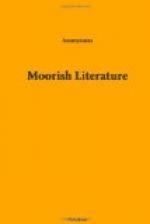The term Moorish Literature may appear ambitious applied to the monuments of the Berber language which have come down to us, or are gathered daily either from the lips of singers on the mountains of the Jurgura, of the Aures, or of the Atlas of Morocco; under the tents of the Touaregs of the desert or the Moors of Senegal; in the oases of the south of Algeria or in Tunis. But it is useless to search for literary monuments such as have been transmitted to us from Egypt and India, Assyria and Persia, ancient Judea, Greece and Rome; from the Middle Ages; from Celt, Slav, and German; from the Semitic and Ouralo-altaique tongues; the extreme Orient, and the modern literature of the Old and New World.
But the manifestations of thought, in popular form, are no less curious and worthy of study among the Berbers. I do not speak of the treatises on religion which in the Middle Ages and in our day were translated from the Arabic into certain dialects: that borrowed literature, which also exists among the Sonalulis of Eastern Africa and the Haussas and the Peuls of the Soudan, has nothing original. But the popular literature—the stories and songs—has an altogether different importance. It is, above all, the expression of the daily life, whether it relates to fetes or battles or even simple fights. These songs may be satirical or laudatory, to celebrate the victory of one party or deplore the defeat of the True Believers by the Christians, resounding on the lips of children or women, or shouted in political defiance. They permit us, in spite of a coarse rhythm and language often incorrect, an insight into their manner of life, and to feel as do peoples established for centuries on African soil. Their ancestors, the Machouacha, threatened Egypt in the time of Moses and took possession of it, and more than twenty centuries later, with the Fatimides, converted Spain to the Mussulman faith. Under Arab chiefs they would have overcome all Eastern Europe, had it not been for the hammer of Charles Martel, which crushed them on the field of Poitiers.
The richest harvest of Berber songs in our possession is, without doubt, that in the dialect of the Zouaous, inhabiting the Jurgura mountains, which rise some miles distant from Algiers, their crests covered with snow part of the year.[2] All kinds of songs are represented; the rondeaux of children whose inspiration is alike in all countries:
[2] Hanoteau, Poesies Populaires de la Khabylie du Jurgura, Paris, 1867, 8vo.
“Oh, moonlight clear in the narrow
streets,
Tell to our little friends
To come out now with us to play—
To play with us to-night.
If they come not, then we will go
To them with leather shoes. (Kabkab.)[3]
“Rise up, O Sun, and hie thee forth,
On thee we’ll put a bonnet old:
We’ll plough for thee a little field—
A little field of pebbles full:
Our oxen but a pair of mice.”




